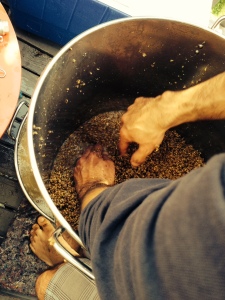I think that my Nana’s recent passing has reminded me that life is short, so you should say something. With that in mind, I’ve decided that it’s time to force a square peg into Brew Hui’s round hole – and tackle an issue of internal congruency that’s been bugging me for ages.
You see, I’m a public health researcher – a budding epidemiologist, to be exact. Alcohol-related harm is not one of my areas of research, although I do work with some very bright cookies who do a lot in this area. The thoughts expressed here are entirely my own; and in all likelihood, they’re also poorly thought-out and probably wrong.
So with arse-covered, let’s proceed.
* * * *
During my hui with Galbraith’s young gun Sam Williamson, he asked me what I did for a crust. After telling him what I just told you, he asked me one poignant follow-up question (which I’ll paraphrase here): how does my involvement in the beer scene ‘fit’ with my public health work, considering the two are more-often-than-not morally opposed to each other?
It was a good question (delivered by Sam with genuine interest, and not a breath of gotcha); and it touched a nerve that had obviously been lying exposed for some time. When it was just Wifey and Mumsy reading this bollocks, the issue didn’t require confrontation; but now it seems the elephant has grown from calf to cow – and thus needs to be ushered-out of the room before it shits all over the coffee table.
Let’s get one thing straight: alcohol does harm. The evidence here is unequivocal; there’s simply no point arguing about it. Alcohol-related acute injury, cardiovascular disease, cirrhosis of the liver, several forms of cancer, etcetera; the list of conditions causally associated with alcohol consumption is both impressive and terrifying. While the jury is still out on the protective effect of moderation, our best-guess is that as alcohol consumption increases, so too does risk of alcohol-related harm.
You can see, then, why alcohol (and its regulation) enjoys heightened attention from public health. Part of the appeal is that alcohol is a modifiable exposure – meaning that we know it causes harm, and there’s something that we can do about it.
Few would disagree that alcohol abuse is a bad idea – and yet somewhat-paradoxically, there is universal acceptance that getting pissed is our right and privilege as adults. The aim of this post is to a) remind my fellow beer enthusiasts that we’re actually better than that; and b) to ask my sisters and brothers in public health (and related sectors) for equivalence and renewed tactics.
It gets a bit preachy at times, but don’t forget: I’m really just talking to myself.
To my fellow beer enthusiasts: we must consider ourselves leaders, and put distance between us and those who seek profit (or drunkenness) at any societal cost. To do this, we must pay attention to the latest research regarding alcohol-related harm, and support regulation which is in-line with that evidence (or self-regulate when change isn’t coming from central or local government). If the evidence says that we need to control availability, affordability and marketing of alcohol, then we must to listen to it and add to the debate; because sometimes, the truth is uncomfortable – and we must be prepared to talk about uncomfortable things.
We must embrace the fact that moderation is an essential bedfellow of appreciation. None of us should be peeled-off the curb on a Sunday morning, nor found face-down in a toilet bowl. We need to hold ourselves to a higher standard, and show the Muggles that our path deserves to be followed.
And we must stop complaining about the price of a pint, or the difference in same-item cost between the supermarket and the pub. Don’t be fooled: it’s not that ‘craft’ beer is too expensive – it’s that crap beer is too cheap. Cut-throat pricing – set by our brewing duopoly, and perpetuated by our supermarket duopoly – has tricked us into thinking that beer should be cheap; and while that may be true of industrially-produced swill, it isn’t true of anything remotely delicious or interesting. We should all be drinking less of more – and be prepared to stump-up more than loose-change for the privilege.
To my sisters and brothers in public health (and related sectors): the vilification of alcohol consumption as a sin only serves to drive a wedge between public health and the general population – a counter-productive move if we actually desire progress against alcohol-related harm. We must not pretend that alcohol is as straight-forward as tobacco; because it isn’t. A cigarette is a cigarette, is a cigarette; but booze isn’t booze. Emerson’s and Cody’s may fall beneath the same high-level banner, but that’s where the similarities end; we mustn’t tar the former with a brush intended for the latter.
We must stop treating beer as the scruffy black sheep of the alcohol family. It isn’t; nor is wine the sophisticated overachiever. As I’m sure you’ll agree, alcohol policies that explicitly call-out beer while remaining schtum on wine aren’t just hypocritically inconsistent; they’re narcoleptically incompetent. Wine-drinkers aren’t of a higher species; they drink too much sometimes, too – and deserve the same legislative treatment as the rest of us.
We must recognise that, in the absence of 1984-esque totalitarianism, booze is here to stay. To effectively reduce alcohol-related harm, public health needs to engage in the promotion of healthy moderation – which we already do, to an extent; but we need to continue to learn more about what works and what doesn’t in this regard. And just as we do (or should do) when we’re confronted with any multi-dimensional problem, we need to take a multidisciplinary approach. We need to recognise the opportunity that the beer appreciation ‘clique’ represent – and while you may not think of beer enthusiasm as a discipline, trust me: as far as consumers go, you’d struggle to find a more educated bunch. I’ve encountered just as many sharp ideas about alcohol policy – both liberal and conservative – over a pint at Galbraith’s as I have in the corridors of our universities. We desperately need to cross the aisle and tap-into that resource; and once we do, I suspect we’ll realise that we’re actually allies with some fairly-symbiotic goals.
* * * *
So there it is: my firmly-held (and probably-naive) views on the subject, dangling free at last. I’m sure that for many of you, all of this high-horse crap is simply preaching to the converted; and I guess I’m really only jotting it down for my own benefit.
I just thought it was high-time that I threw-down a gauntlet, so that I could swiftly stoop to pick it up myself.
Twitter: @jasegurney | Facebook: www.facebook.com/brewhui


Nicely said.
The ubiquity of cheap booze is definitely made worse at the moment by Asahi / Independent / Boundary Road (etc.!) muscling up to the table turning our old duopoly into a triopoly / oligopoly. Especially given that their core business is and always was RTDs — the budget booze that probably *should* be the poster child for problem drinking more than beer currently is — they’re all about competing on price.
I’m so sick of people looking longingly at the lower price of beer / lower excise tax in the U.S., for example. I mean, 1) Their social services are, let’s just politely say, hopelessly anemic, and 2) good beer is a stupidly affordable luxury already!
These days I just say:
“Go to Norway. THEN you can complain to me about the price of beer.”
Thanks Phil!
You’re so right – beer *is* a stupidly affordable hobby…we’re lucky, lucky bastards.
Speaking of hipocracy, I have in my professional career seen one of our country’s more vocal (or at least frequently quoted) campaigners for drastic alcohol reform, at the pub completely munted. But that’s none of my business…
Compete segue – in 1984, alcohol is mentioned a lot. The Party let’s people get drink as another method of control.
Thanks Dylan – I think about that sort of hypocrisy all the time…I think it’s what spurred me on to jot down this post. I feel like a weight has been lifted from my shoulders…